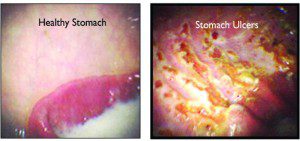By Steven A. Meckstroth, MD – Gastroenterology Specialists


A stomach ulcer, also known as a peptic ulcer, is a sore in the lining of your stomach or your duodenum, the first part of your small intestine. A burning stomach pain is the most common symptom.
Pain caused by an ulcer in the digestive tract:
• Starts between meals or during the night
• Briefly stops if you eat or take antacids
• Lasts for minutes to hours
• Comes and goes for several days or weeks
The most common cause is infection with a bacterium called Helicobacter pylori. Another cause is the long-term use of non-steroidal anti-inflammatory medicines (NSAIDs) such as aspirin and ibuprofen. Stress and spicy foods do not cause ulcers, but can make them worse.
To see if you have an H. pylori infection, your doctor will test your blood, breath, or stool. Your doctor also may look inside your stomach and duodenum by doing an endoscopy or x-ray.
Peptic ulcers will get worse if not treated. Treatment may include medicines to reduce stomach acids or antibiotics to kill H. pylori. Antacids and milk can’t heal peptic ulcers. Not smoking and avoiding alcohol can help. You may need surgery if your ulcers don’t heal.
When an ulcer gets very bad, it can eat all the way through the intestinal wall. The resulting hole in the intestine is called perforation. The contents of the intestine (food, bacteria, and digestive juices) can then spill out. These substances can injure other tissues and cause serious infection.
Preventing Ulcers
Peptic ulcers can be prevented by avoiding things that break down the stomach’s protective barrier and increase stomach acid secretion. These include alcohol, smoking, aspirin, non-steroidal anti-inflammatory drugs, and caffeine.
Preventing infection with H pylori is a matter of avoiding contaminated food and water and adhering to strict standards of personal hygiene. Wash hands carefully with warm water and soap every time the bathroom is used, diaper changed, and before and after preparing food.
If you need the pain relief and anti-inflammatory action of aspirin or an NSAID, you can reduce your risk of ulcers by trying the following:
• Try a different NSAID, one that is easier on the stomach.
• Reduce the dose or the number of times you take the medication.
• Substitute another medication, such as acetaminophen (Tylenol).
Don’t resort to self-medication. If you opt for a wrong drug, you will just end up worsening your condition. While antacids are effective in providing relief from pain by raising the level of pH in the stomach, you need to understand that this relief is temporary. So, don’t take antacids unless recommended by a doctor. Do contact your doctor if you have been experiencing any of the aforementioned symptoms. Follow the guidelines regarding the frequency and dosage of the drug. This will surely pave the way for a speedy recovery.
For more infromation about stomach ulcers and would like to schedule an appointment to meet with one of our physicians, please contact our office at (239) 593-6201 or send an email with the subject “Stomach Ulcer” to gastro@gispswfl.com.
 Southwest Florida's Health and Wellness Magazine Health and Wellness Articles
Southwest Florida's Health and Wellness Magazine Health and Wellness Articles
